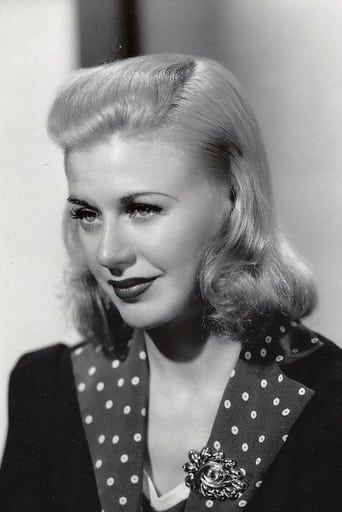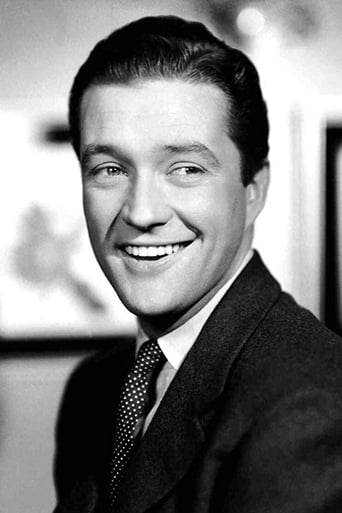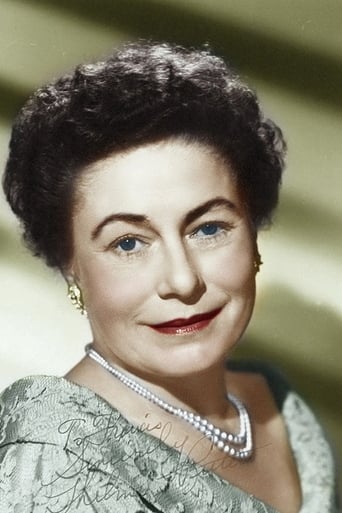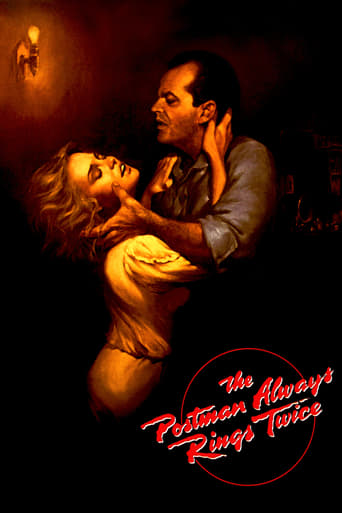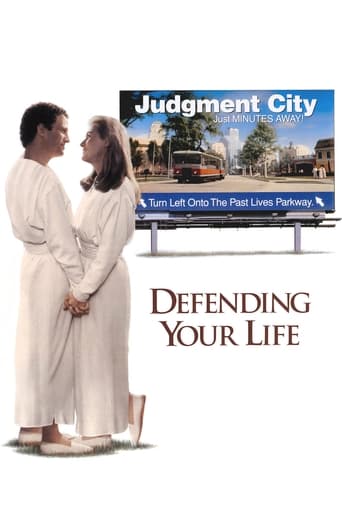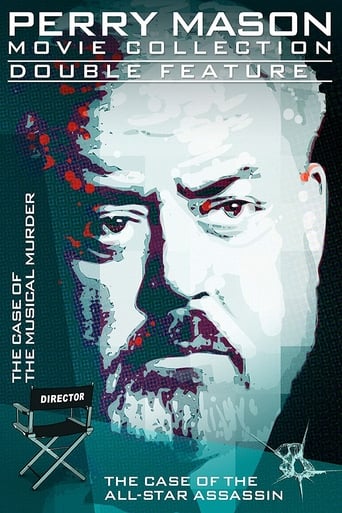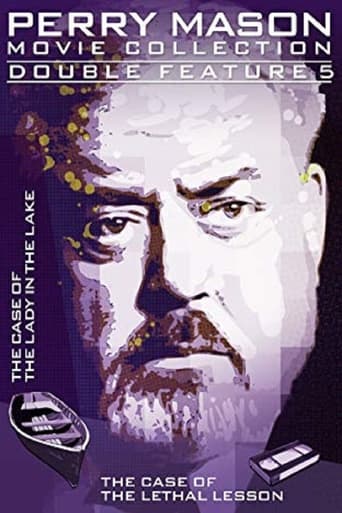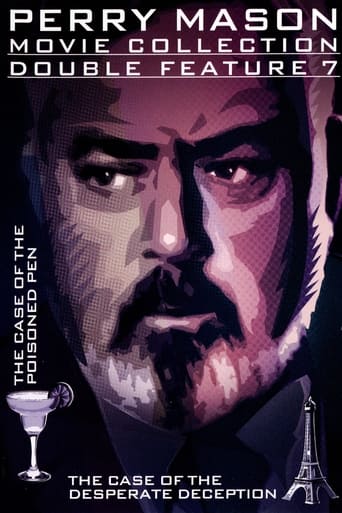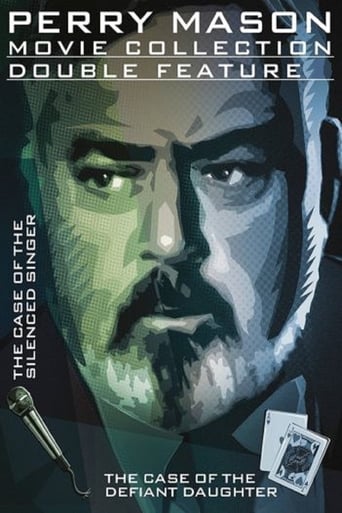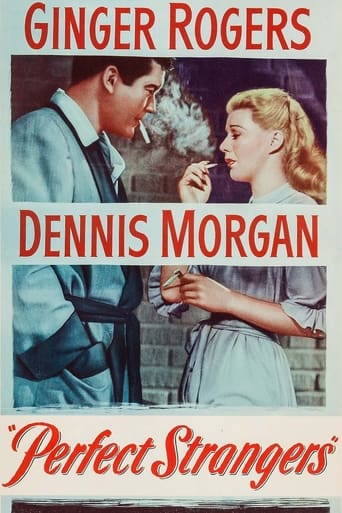
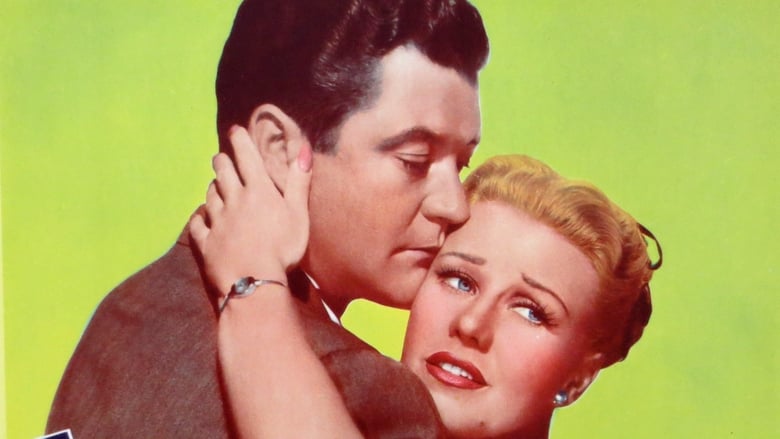
Perfect Strangers (1950)
Romance at a murder trial with a pair of sequestered jurors who are the only ones who think that the woman in the dock is innocent. Separated from their normal lives, jurors Terry Scott and David Campbell start to fall in love.
Watch Trailer
Cast
Similar titles

Reviews
Very best movie i ever watch
How sad is this?
A waste of 90 minutes of my life
At first rather annoying in its heavy emphasis on reenactments, this movie ultimately proves fascinating, simply because the complicated, highly dramatic tale it tells still almost defies belief.
Producer: Jerry Wald. Copyright 25 March 1950 by Warner Brothers Pictures, Inc. (sic). New York opening at the Strand: 10 March 1950. U.S. release: 25 March 1950. U.K. release: 31 July 1950. Australian release (shortened to 78 minutes): 8 November 1951. 7,919 feet. 88 minutes.U.K. and Australian release title: TOO DANGEROUS TO LOVE.NOTES: Ladies and Gentlemen opened on Broadway at the Martin Beck on 17 October 1939 and ran 105 performances. Helen Hayes and Philip Merivale starred, whilst Robert Keith, Evelyn Varden and Connie Gilchrist figured in the support cast. Gilbert Miller produced, Charles MacArthur and Lewis Allen directed.The film's semi-documentary opening was cut from the Australian release version and is often omitted by TV broadcasters.COMMENT: Perfect Strangers has a good idea back of it but unfortunately fails to live up to expectations. It commences promisingly in semi-documentary fashion showing the fascinating process by which jurors are selected and all goes interestingly enough (with good use of real locations) until the jury is locked up and we discover that they are not as appealingly well-rounded or cleverly diverse a crowd as we would wish. In fact, to a man (and a woman) they are caricatures - and rather dull caricatures at that. Admittedly the players do their best, but there is a sense of strain and artificiality about their endeavors. Fortunately, Windust keeps the film moving briskly enough (except for the wearisomely long tete-a-tete right at the conclusion) and it is so superbly photographed it is always a pleasure to look at, even when most tiring to listen to. Miss Rogers is good to look at too, even when she wears her hair in an unbecoming upswept style. It's a pity she wasn't given a more personable co-star than Mr Morgan, though aside from his unconvincing speeches at the conclusion, he is adequate. The support players try hard (perhaps too hard) to make an impression, with Margalo Gillmore taking the honors in a line-up that we feel the casting director could have improved if he'd tried a little harder. The film editor too could have improved the movie with just five or ten minutes of judicious trimming. It's a pity that Windust didn't put the same attention into his script and his players as he does into attractive framing and pacey camera movements (still a fluid camera is one way to keep a story moving). In all, certainly disappointing, but by no means a write-off. All the same, odd to see Hecht and MacArthur's name associated with such a bland offering, which completely lacks the sharp, bitingly caustic, frantically witty dialogue, the mordantly observed characters and fast, satiric plot of The Front Page.OTHER VIEWS: A long review in The Monthly Film Bulletin commends the script's presentation of intellectual arguments on both the trial and the social issues of divorce, as well as its realistic depiction of court proceedings. Technically, however, the critic feels the film is a photographed stage play, with Morgan and Rogers dominating the screen.
Some scintillating pre-credits footage of bureaucrats shuffling through card files of prospective jurors, and we're off on the world's least interesting murder trial, propelled by a baffling romance between jurors Ginger Rogers and Dennis Morgan. Both are still married, she's separated, and the movie doesn't seem to know how to treat the prospect of their getting together--we're supposed to want them to, yet also not to want them to, because of all the lives it would disrupt. Meantime, the rest of the jury appears to be the stupidest ever, led by Thelma Ritter, doing her usual welcome Tenth-Avenue-salt-of-the-earth thing, but with bad lines. Rogers, as was her wont at this stage of her career, is more glamorous than the woman she's playing, and one detects a large whiff of star vanity; Morgan looks understandably bored. The movie's unaccountably fascinated with the minor details of jury duty, and everyone on this panel is such an idiot that there's nothing to do but watch them jabber and spar and lead to their inevitable verdict. Bretaigne Windust's direction (now there's a name) is disinterested and uncinematic, but not even a Capra or a Sturges could have made anything of this script.
The half-hearted romance plot between Ginger Rogers and Dennis Morgan takes away from an otherwise interesting ensemble piece about different people living together and the American jury system.PERFECT STRANGERS is about a jury for a murder trial. In order to protect the integrity of the jury, the judge arranges for the twelve jurors to be held up in a hotel, cut-off from all outside contact, for the duration of the trial.The film, based on a play co-written by Ben Hecht and Charles MacArthur, provides an interesting look at the life cycle of a jury, from the initial summons to the juror selection process to the trial and final deliberations. Like 12 ANGRY MEN (1957) it shows how jurors see things in different ways and how personal prejudice gets in the way of fair and balanced decision making. The movie also gives a humorous peek into the press room, where newspaper reporters scrape around for the scoop of the day (territory previously explored in THE FRONT PAGE and HIS GIRL_FRIDAY, also based on a Hecht/MacArthur play).The movie doesn't delve very deeply into the courtroom proceedings or the facts of the murder case. The focus is instead on the jurors, twelve perfect strangers sharing a common experience over several weeks. The ensemble cast includes multiple Oscar-nominee Thelma Ritter and Alan Reed (the voice of Fred Flintstone), as well as Ginger Rogers, Dennis Morgan, and others.My favorite thing about the movie is seeing twelve perfect strangers from all walks of life forced to live together in a hotel suite. It's like going to camp. There are two women to a room, but the men have to double up (four to a room). They pass the time by playing cards, arguing about the trial, and (in Ginger's case) falling in love. They eat dinner together, they write messages for their loved ones at home, and they are chaperoned at all times by the bailiff.I liked the idea of a sequestered jury ensemble, but the film puts too much emphasis on the romance arc between the Rogers and Morgan characters (a divorcée and a married man, respectively). And the romance is the weakest part. (Sure, they're both good-looking and trapped on a jury together, but can their "love" really work out?) The film has its moments, but falls short of its potential. It's still a classic "jury movie" and is worth checking out for Thelma Ritter fans and Ginger Rogers completists.
Ginger Rogers didn't have too much luck in her choice of material by the time the late '40s rolled around--except for a reunion with Fred Astaire in 'The Barkleys of Broadway' most of her dramatic films were a disappointment--but 'Perfect Strangers' has a well-written script from a play by Ben Hecht and Charles MacArthur. The two stars play jurors who find themselves on a jury panel for a murder trial. Sequestered, they fall in love despite the fact that Dennis Morgan is married, unhappily. The suspense comes from wondering what will happen to their relationship when the trial ends.Ginger had wanted to work with Dennis Morgan since their last teaming in 'Kitty Foyle'. Under Bretaigne Windust's sensitive direction, the two stars give interesting performances. Among the supporting roles, Thelma Ritter delivers her usual competent work. Well worth viewing, but not yet released to video. You'll have to catch it on one of the cable stations.
